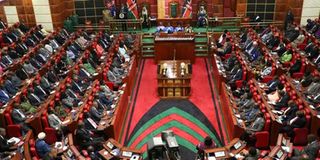Strong Senate key to restoring integrity of Parliament

A joint parliamentary sitting on March 27, 2014. PHOTO | BILLY MUTAI |
What you need to know:
- Senate is rightly embraced as a necessary check against the localism, mediocrity and parochialism of often juvenile lower houses.
March 15, 44 BC, Rome, Italy. A group of senators stab Julius Caesar to death at a meeting in Senate. The brutal murder of Rome’s most decorated son was all about the power and interests of some 60 senators, including Caesar’s own protégé, Marcus Brutus.
History’s most famous assassination enraged Rome’s lower classes — with whom Caesar was popular — that a tiny group of aristocrats had killed their most patriotic, charismatic and talented leader.
The murder precipitated the end of the Roman Republic and the rise of dictatorial emperors who abolished the Senate. But the Romans have bequeathed the world with the concept of Senate as an assembly of the senior, wiser and respected members of the society or ruling class.
A series of liberal revolutions — particularly the French and American Revolutions — popularised the constitutional principle that legislatures represent the people as the sovereign. But, in reality, nothing else is holier than the interests of the cliques, cartels or syndicates that everywhere hold parliaments in thrall. The rest of society — including the sovereign — becomes the proverbial children of a lesser God!
This has led many thinkers and revolutionaries to see parliaments as a necessary evil. As Vladimir Lenin once quipped, the “oppressed are allowed once every few years to decide which particular representatives of the oppressing class are to represent and repress them in parliament.”
By the same token, parochial interests have turned parliaments into veritable graveyards of decency, integrity and rule-based societies and threats to the progress of nations. This is why the revered crusader for the emancipation of African slaves, William Wilberforce, once wondered: “Can one serve God and one’s nation in parliament?”
The resurgence of democracy in Africa has popularised the “Roman Senate,” the house of the wise, as an essential part of parliament that brings wisdom, gravitas and experience to the legislature.
Senate is rightly embraced as a necessary check against the localism, mediocrity and parochialism of often juvenile lower houses. It is also seen as a tool of checking the excesses of a single-chamber parliament and ensuring that everything decided in parliament is carefully thought through in a deliberative manner.
It was this quest for checks, balances and thoroughness that inspired the restoration of the Senate in Kenya in 2013, almost a half-century after it was disbanded in 1966.
However, even as the Senate becomes an indispensable feature of Africa’s nascent democracies, the new Senates are ridiculously standing on their head.
In Kenya, the 67-member Senate is heavily encumbered, embattled and endangered. The drafters of the new constitution inadvertently hewed the Senate as “a flower girl” of a bloated National Assembly. Except its powers of impeachment over the President, Deputy President, County Governor, and Deputy Governors, the Senate has no other distinct powers which the Lower House cannot contest or frustrate. Expectedly, this has triggered running supremacy battles between the two houses.
Kenya’s Senate is tethered to merely representing the interests of the counties and their governments. While the Canadian Senate is responsible for protecting the rights and interests of regions, in Kenya restricting the powers of the Senate to the counties has taken away matters of supreme national importance from “the House of the Wise”, which is generically expected to be senior and sober to represent national interests.
Related to this, even though the Senate is empowered to participate in law-making, its role is explicitly limited to considering, debating and approving bills concerning counties and determining allocation of national revenue among the devolved governments.
This has reduced Kenya’s Senate to a pale shadow of other “houses of the wise” across the world as the supreme overseers of their national interests. Senates are everywhere the more powerful of the two chambers of parliament with clear powers and functions which are not shared with the lower house.
This becomes clear from the US Constitution which provides the Senate with special powers. First, it is the sole responsibility of the Senate to vet or approve presidential appointments and nominations. Senate also ratifies international treaties. Under special circumstances, it elects the vice-president, especially where state electoral votes are tied.
Further, Senate considers bills introduced by the President and has the most powers to create new legislation with the exceptions of revenue-related bills or legislation governing the use of federal money. Senate has extensive investigative powers and can hold official hearings and summon witnesses.
And, it presides over the impeachment proceedings started in the House of Representatives.
Rather than seek to correct this anomaly, Kenya’s public debate on the Senate is a perfect dialogue of the deaf that reveals two extremes. Civil society activists have called for the abolishing of the Lower House, leaving the Senate and moving the 47 women representatives to the Upper House.
Inversely, MPs want Senate done away with for being an “unnecessary burden to the taxpayer”.
Both extremes are oblivious of the principle of checks and balances. The outpouring of public rage over the role of the lower house in the vetting of presidential appointments and nominations has refocused attention on the need to re-assert the supremacy of Senate in our constitution as the only path to restoring the sanity, dignity and integrity of Kenya’s Legislature.
Doing so will, inescapably, require a referendum.
Prof Kagwanja is chief executive, Africa Policy Institute, and former government adviser [email protected]





